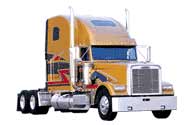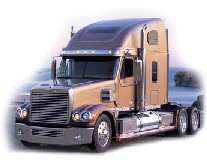February 10, 2003 |
ISSN 1550-9214 |
Cummins Fights FUD with Warranties:New Diesel Engines Aren't Duds, | ||||||||||||||||||||||||||||||||||||||||||||||||||||||||||||||||||||||||
|
"WARRANTY RISKS STILL EXIST:
"Cummins is in the midst of launching both medium and heavy-duty emission compliant engines. Current warranty expense is 3.6% of sales, but could go higher if there is a significant issue with product quality." |
An automotive industry expert contacted by Warranty Week said 3.6% was "exceptionally high." In fact, he asked if that figure was for completed vehicles or just for the engines, because warranty costs of 2% to 3% for the whole vehicle are more typical based on his experience at General Motors Corp. and elsewhere.
"3.6% of the price of a diesel engine would probably more than cover the typical warranty expense of an entire car," the source said. When he was the service manager of a GM division in the 1980s, warranty expenses were closer to $20 per $1,000. And that was in the "bad old days" when quality was an afterthought, if people were thinking at all.
He noted, however, that the first 90 days after an engine ships is the period when the manufacturer gets the first hint of trouble. So if it hasn't happened yet, it's probably not going to happen. "I would expect you're going to see an increased failure rate right out of the chute if they're unreliable," he said. "It is extremely unlikely that you're going to have a situation where those engines are on the market for six months or a year before somebody realizes they're unreliable."
Great Results So Far
 Amy Davis, director of communications strategy at Cummins, said the company is generally pleased with the rollout of its new EPA-compliant ISB, ISM, and ISX engines (the ISC design remains unchanged for now). "We're really seeing great results in the field so far with the engines we're putting into service," she said.
Amy Davis, director of communications strategy at Cummins, said the company is generally pleased with the rollout of its new EPA-compliant ISB, ISM, and ISX engines (the ISC design remains unchanged for now). "We're really seeing great results in the field so far with the engines we're putting into service," she said.
The cooled EGR subsystem is the only truly new part of the Cummins engines, she added. Davis said the company has been selling the variable geometry turbocharger in Europe for several years. "We have over 55,000 of those turbochargers in operation. So I guess from our perspective it is not such a big change," she said.
Davis noted that both Volvo and Detroit Diesel also are using cooled EGR technology. Caterpillar is not. In fact, in an online fact sheet, CAT claims its own Advanced Combustion Emission Reduction Technology (ACERT) is better than EGR. Some excerpts:
- "The end result is engines that provide a better lifetime cost/value comparison than engines equipped with cooled EGR (exhaust gas recirculation)."
- "Caterpillar ACERT technology outperforms cooled EGR. When it comes to technology, Caterpillar focuses on long-term solutions that benefit the industry, the customer and the environment."
- "Cat, like other engine manufacturers, used EGR successfully for many years. When it became clear that cooled-EGR would not provide vehicle owners with the reliability and value as is expected from the industry leader, Cat broke away from the pack to develop a technology breakthrough -� a more environmentally favorable alternative -� ACERT. Instead of staying with cooled-EGR, Cat has chosen to deliver to the marketplace an engine technology that will meet customer expectations for performance, lowered operating cost and proven resale while maintaining our commitment to the environment."
The EPA certified the Cummins ISX engine in April, the ISB engine in August, and the ISM engine in September. Caterpillar and Detroit Diesel asked the U.S. District Court for the District of Columbia to delay the Oct. 1 deadline. That motion was rejected on Sept. 5, 2002, which the EPA gleefully reported on Sept. 6, complete with a statement from Administrator Christine Todd Whitman, who doesn't ordinarily bother to herald every little procedural victory. Meanwhile, the EPA approved Volvo's VED12 engine on Sept. 30, and it was in the trucks rolling off the assembly line in November. Detroit Diesel got its Series 50 and Series 60 engines certified on Oct. 14.
Delays in Certification
 So where's Caterpillar? On Sept. 26 the company announced that the EPA didn't have enough time to certify its engines, but it "does not foresee any obstacles to full certification." However, the final certification of the C9 engine didn't occur until Jan. 17, and full production is scheduled to begin in the coming weeks.
So where's Caterpillar? On Sept. 26 the company announced that the EPA didn't have enough time to certify its engines, but it "does not foresee any obstacles to full certification." However, the final certification of the C9 engine didn't occur until Jan. 17, and full production is scheduled to begin in the coming weeks.
In its year-end 2002 report, Caterpillar said external sales of its engines were down 5% year-over-year to $1.84 billion in the fourth quarter. Internal sales of engines to the machinery division were up 6.75% to $316 million in the quarter. The more revealing figure, however, is that engine sales in North America -- the only sector impacted by the EPA's deadline -- were down 17% sequentially, from $873 million in the third quarter to $728 million in the fourth quarter.
So connect the dots. Cummins takes an early lead with certifications. Caterpillar and Detroit Diesel tell the EPA they need more time, but they're denied. Caterpillar criticized EGR, and customers experience fear, uncertainty, and doubt. A cloud of worry surrounds 2002 EGR engine launches by Cummins, Volvo, and Detroit Diesel. Some say Caterpillar operated the cloud-making machine. And Caterpillar has nothing comparable to sell until early 2003. And then, what a surprise! Just in time for the first ACERT deliveries, the cloud lifts, the economy brightens, and everyone's sales increase late in the year. Can it be that simple?
Davis said she couldn't comment on the 3.6% figure cited by Goldman Sachs. However, she strongly disagreed with Shatney's prediction that it could go higher. "If you look at the past year, our warranty costs, as a percentage of sales, have actually been on the decline. I don't see this new product introduction negatively impacting that trend," she said.
Declining Warranty Costs
Indeed, in 2000, what the Cummins accountants call "product coverage costs" consumed 4.2% of sales, up from 3.7% in 1999. The year before, Cummins had initially budgeted 3.3%, but problems with the then-new ISC engine forced that allocation up to a whopping 4.5%. Cummins had to take a $92 million special charge in 1998, of which $78 million went directly into the depleted warranty fund ($43 million for basic and $35 million for extended warranty costs).
Lustgarten sees some value in the Cummins Uptime Guarantee, in the way it seems to give the customer more than before. After all, this is a technology change brought on by government regulation, he notes. And it's no secret that there's a reduction in miles per gallon, even if it's only a slight decrease. Still, the customer needs to get more of something, or else they're going to shop used. A better warranty is a step in that direction. "That's the cost of trying to stimulate the marketplace to accept the inevitable," he said, "particularly at a time when the tendency is to postpone..."
 Stephen Latin-Kasper, director of market data and research at the National Truck Equipment Association in Farmington Hills MI, said it's hard to separate out the effect the EPA rules are having on truck sales, which were trending downwards anyway due to the weak economic conditions.
Stephen Latin-Kasper, director of market data and research at the National Truck Equipment Association in Farmington Hills MI, said it's hard to separate out the effect the EPA rules are having on truck sales, which were trending downwards anyway due to the weak economic conditions.
"I can't say there's a trend yet regarding these new engines," Latin-Kasper said. "I mean, people have to buy the new engines now whether they like them or not. I think that ultimately people are going to end up liking them, and as they become more accepted, more and more of them will be bought."
"A lot of people assume there are going to be bugs in any new product: software, medical equipment, trucks, whatever. I think that goes along with fear of change." He said in this case, fear of change means fear of breakdowns, so an even better warranty is needed to produce the same level of peace of mind as before.
End of the Decline?
Tom Freiwald, vice president of marketing at Detroit Diesel, a DaimlerChrysler subsidiary, said he thinks the whole Oct. 1 issue is old news at this point. "The whole industry saw a big downturn after Oct. 1st, and nobody was quite certain how long it would last," he said, "but we've brought people back to work and increased production several times this year, because demand is picking back up nicely."
Of the pre-deadline FUD, very few of the predicted calamities came to pass. About the only noticeable change in the new engines is a 5% drop in fuel economy, Freiwald said. "The fleets that have them have not had any difficulty with them," he said, although it's still early days. "Business is picking up nicely."

|
| Cummins Northwest Inc. Anchorage, Alaska |
Larry Fuller, service manager at the Anchorage branch of Cummins Northwest Inc., said the new EPA engines haven't yet made it up to Alaska. But he's been briefed by both Detroit Diesel and Cummins about what's on the way.
"They added exhaust gas recirculation, variable geometry turbochargers, and a couple of other odds and ends, and it increases the cost. It decreases the fuel mileage. You pay a penalty for this new engine," Fuller said.
Is he worried? Not a bit. Advance word from the lower 48 is that everything is just fine. Yes, the engines are different, but they're not radically different.
"The drivers notice a difference," he said. "With this variable geometry turbocharger, the engine makes boost pressure at times when you think that it wouldn't." It's as if the engine is predicting the imminent need for acceleration. "Then, when you get back into the throttle, it's ready to go. It's got the boost, and when you put the fuel to it, it won't leave a cloud of smoke. So to the drivers, that seems a little odd."
| Click Here for an update |

|
This Week’s Warranty Week Headlines | ||
|
Extended warranty providers weather the holiday sales doldrums, most made it through the fourth quarter of 2002 largely unscathed. This Week in Consumer Electronics, Feb. 10, 2003 | ||
|
Why's my cell phone melting? Nokia warns customers that unauthorized third party batteries can overheat, voiding warranty CNET News.com, Feb. 7, 2003 | ||
|
Callaway Golf Co. reports 2002 financial results; earnings increase 26% after one-time gain from $17 million warranty reserve reduction. Press Release, Feb. 6, 2003 | ||
|
Datamonitor report calls CRM in 2002 "a shrinking market," revenue recovers to US$3 billion in 2005 but by then the damage is done to current vendors. Datamonitor, Feb. 4, 2003 | ||
|
California Department of Consumer Affairs finds auto repair problems are top consumer complaint in 2002. News Release, Feb. 3, 2003 | ||
More Warranty Headlines below | ||

|
Warranty Headlines (cont’d) | ||
|
Chrysler announces sales decline in January, launches "The Best Values in America" ad campaign emphasizing 7/70 warranty. USA Today, Feb. 3, 2003 | ||
|
TREAD Act early warning deadline looms Industry Week, Feb. 1, 2003 | ||
|
Hyundai pumps up loan deals & rebates to counter Detroit's incentives USA Today, Jan. 30, 2003 | ||
|
Zenith recalls 80K large-screen analog projection TVs made in 1995-98 due to possible coolant leakage Consumer Product Safety Commission, Jan. 30, 2003 | ||
|
Former U.S. Senator Frank Moss of Utah, co-author of Magnuson-Moss Warranty Act, died Jan. 29 at age 91. Fox News, Jan. 29, 2003 | ||
More Warranty Headlines below | ||
|
|
Warranty Headlines (cont’d) | ||
|
Siebel Systems to make software for IBM's WebSphere application server CNET News.com Jan. 28, 2003 | ||
|
Microsoft Business Solutions to resell customer relationship management package by Crystal Decisions News Release, Jan. 21, 2003 | ||
|
Microsoft Business Solutions CRM home News Release, Jan. 20, 2003 | ||
|
Feds warn on high-tech devices in autos Associated Press, Jan. 15, 2003 | ||
|
Six dirty secrets of car sales. Getting overcharged on the car lot? You may not even know it. CNN/Money, Jan. 10, 2003 | ||
More Warranty Headlines below | ||

|
Warranty Headlines (cont’d) | ||
|
Tire blow-out case settled. Ford, Bridgestone reach deal in death of NAACP official. The Detroit News, Jan. 9, 2003 | ||
|
Shareholders of Interstate National Dealer Services Inc. approve merger with COO Cindy H. Luby's CHL Holdings Corp. News Release, Jan. 8, 2003 | ||
|
Finbarr ONeill: Kicking Hyundai into high gear. How he transformed the Korean carmaker into a player. Newsweek, Jan. 6, 2003 | ||
More Warranty Headlines | ||

|
Warranty Headlines (cont’d) | ||
More Warranty Headlines | ||
Related Articles From Warranty Week |


 In late January, Cummins announced fourth quarter and full year numbers for 2002 that were not as bad as had been expected. Because Cummins is currently going through a new product introduction cycle mandated by the U.S. Environmental Protection Agency's stricter diesel engine emissions regulations, analysts were prepared for another warranty mishap.
In late January, Cummins announced fourth quarter and full year numbers for 2002 that were not as bad as had been expected. Because Cummins is currently going through a new product introduction cycle mandated by the U.S. Environmental Protection Agency's stricter diesel engine emissions regulations, analysts were prepared for another warranty mishap. Under terms of that consent decree, the manufacturers had until Oct. 1, 2002 to modify their engines so that their emissions levels came in below the EPA's
Under terms of that consent decree, the manufacturers had until Oct. 1, 2002 to modify their engines so that their emissions levels came in below the EPA's  "The warranty reserve you take is always higher, because it's a new product," he said. "Whenever you have new product you always go through that battle. But it's nothing out of the ordinary. And we're not hearing any major issue at this point."
"The warranty reserve you take is always higher, because it's a new product," he said. "Whenever you have new product you always go through that battle. But it's nothing out of the ordinary. And we're not hearing any major issue at this point."